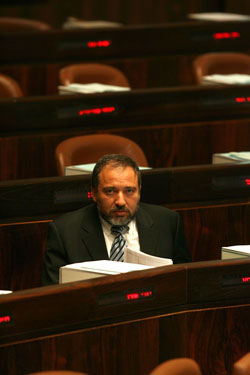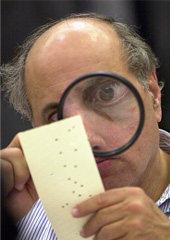A "government of national unity" always looks good on its face. It's one of those things that should work, like socialism or perpetual motion. But the reason we divide among ourselves into different political parties is that we disagree on issues that we deem important. Republicans are free traders, strong on national defense, supportive of small business. Democrats are protectionists, multilateralists leaning strongly toward pacifism, and supportive of labor in the abstract, big labor and big business in practice.
Similar divisions exist in Israel, where the division used to be between Likkud and Labour, and where now it's between Likkud and its offshoot Kadima. Likkud's conservative to the point of scaring the terrorists and their supporters -- which I tend to think of as a good thing, and Kadima's the Oslo wing, given to Norwegian-brokered ceasefires, land for peace, and exchanging a thousand Arabs for a single Israeli. They don't think alike, and as time goes by they're thinking more differently.
Kadima's natural ally has become Labour, the old-style Social Democrat party that's probably closer to the U.S. Democrats than either Kadima or Likkud. Likkud allies more naturally with Israel Beitenu, whose head, Avigdor Lieberman, is denounced by the Arabs for all sorts of sins. Today's example is Egypt calling him a racist. Shas, being out there somewhere and heavily populated by holy men, makes uncomfortable common cause with any of them.
If the thought of a Government of National Unity™ is ludicrous in the U.S., why isn't it ludicrous in any other country? In all the places it's been tried it's failed. Zim-bob-we's the current primo example, but the landscape is littered with lots of others, including Fatah-Hamas. |
 The Kadima faction stood solidly behind its chairwoman, Foreign Minister Tzipi Livni, in outlining its official position, presented yesterday: either a unity government headed by Kadima, a rotation of the premiership with Likud, or the opposition. Transport Minister Shaul Mofaz, who Kadima insiders say would like to see the faction in the coalition, even if it is headed by Likud, said, "a unity government headed by Kadima is what is needed. A coalition of 65 MKs will not make it." Sources close to Mofaz said yesterday that he would not allow attempts to drive a wedge between him and Livni by spreading rumors. The Kadima faction stood solidly behind its chairwoman, Foreign Minister Tzipi Livni, in outlining its official position, presented yesterday: either a unity government headed by Kadima, a rotation of the premiership with Likud, or the opposition. Transport Minister Shaul Mofaz, who Kadima insiders say would like to see the faction in the coalition, even if it is headed by Likud, said, "a unity government headed by Kadima is what is needed. A coalition of 65 MKs will not make it." Sources close to Mofaz said yesterday that he would not allow attempts to drive a wedge between him and Livni by spreading rumors.
Livni came to yesterday's meeting after having spoken on the phone with the party's ministers and lawmakers to make sure none intended to surprise her and contradict her stand on heading for the opposition rather than going into a coalition headed by Likud. Even Housing and Construction Minister Ze'ev Boim toed the line.
Livni's position was revealed ahead of the meeting already, when TV cameras and microphones caught her in conversation with Prime Minister Ehud Olmert. Livni asked Olmert what he was going to say at the cabinet meeting: "You're going to say something about rotation," to which Olmert responded: "That I want a broad coalition." Livni then said, "Ehud, do me a favor." When they realized they were on camera, Livni wrote Olmert a note, which the cameras caught later: "I have no intention of being in a unity [government] under Bibi and don't hint in that direction. What you're saying is leading there and that's not the Kadima position."
Livni did manage to prevent Olmert from transmitting a message of a broad coalition. Instead, he told the cabinet yesterday that he "hopes a coalition will be established quickly in the context of the challenges Israel faces."
In the faction meeting, Livni said emphatically that Kadima had won and would form the next government. "What's not clear? Twenty-eight is more than twenty-seven. Twenty-eight is not a figure. It's hundreds of thousands of people who have expressed their faith in us. There was no ballot at the polling station with the word 'bloc' or 'camp' on it."
| I think this is the Hebrew equivalent of "I won" ... |
Alluding to Netanyahu's coalition-making efforts, Livni said: "I am well aware of the deals that were made even before the elections and are still being made at this very moment, to do something against the will of the voter.
"There will be moves now that could be enticing," Livni said, but added, "In this task of putting together a coalition I don't intend to cheat myself or the public. We will continue to serve the public, whether we form a coalition as the public wants, or from the opposition," Livni said. |
 from an Egyptian news daily
from an Egyptian news daily
 The International Criminal Police Organization (ICPO) has issued a circular calling for the arrest of 15 top Israeli officials over war crimes.
The International Criminal Police Organization (ICPO) has issued a circular calling for the arrest of 15 top Israeli officials over war crimes.  Far-right politician Avigdor Lieberman endorsed Benjamin Netanyahu for Israeli prime minister on Thursday, all but guaranteeing that Netanyahu will be the country's next leader.
Far-right politician Avigdor Lieberman endorsed Benjamin Netanyahu for Israeli prime minister on Thursday, all but guaranteeing that Netanyahu will be the country's next leader. Israel's political leadership decided yesterday to prepare the text for a cabinet decision on a deal with Hamas for captured soldier Gilad Shalit and a renewed cease-fire. Prime Minister Ehud Olmert,
Israel's political leadership decided yesterday to prepare the text for a cabinet decision on a deal with Hamas for captured soldier Gilad Shalit and a renewed cease-fire. Prime Minister Ehud Olmert,  The Kadima faction stood solidly behind its chairwoman,
The Kadima faction stood solidly behind its chairwoman,  JERUSALEM, Feb. 11 (UPI) -- The makeup of Israel's next government remained unclear early Wednesday as votes counted thus far showed the Kadima and Likud parties neck and neck.
JERUSALEM, Feb. 11 (UPI) -- The makeup of Israel's next government remained unclear early Wednesday as votes counted thus far showed the Kadima and Likud parties neck and neck.